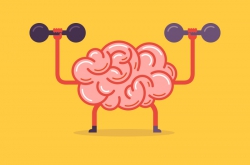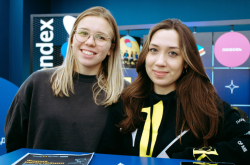TeachMePlease is a relatively young project. How long has it been around?
We’ve started working on the platform on June 18, 2016. The first public version was published in December, about a year ago. Thus, the platform has already been operating for a year, yet we are still at the early stages of its development.
How is TeachMePlease different from other educational platforms?
There are two types of businesses. Some follow the classical system where objects of value are transferred from one participant to another - this is how most internet shops operate. The other type follows the platform approach, which implies that the system does not have anything to do with producing, owning or transferring objects of value (in our case, we do not teach anyone anything), but creates the necessary conditions and instruments for the those using the system. Actually, we don’t even divide our participants into educators and students; today’s educator can well become a student the next day.
There aren’t many similar players on the market, and all of them focus on something in particular, even major projects like Coursera. Many of them aspire to act as independent sources of education, i.e. organize educational processes and teach people themselves. Our task is different: we are set on creating enough instruments and the necessary conditions so that the platform’s users will be able to choose the instruments they desire themselves. In other words, even we don’t know all of the possible ways of how they’ll be using the system. Nowadays, many rapidly developing projects follow the platform approach - ones like AMAZON, Apple, Instagram and others. The platform does not own objects of value, it focuses on creating an ecosystem. Thus, we don’t have any competitors. In general, there’s yet to be a full-blown platform in the field of education.
 Teach Me Please. Credit: teachmeplease.ru
Teach Me Please. Credit: teachmeplease.ru
So, what’s the problem? People generally like to systemize everything.
The educational field is really tradition-bound and thus cumbersome. Thus, people who can create and transfer high-quality educational services can’t sell them and even don’t understand how it’s done. Our goal is to provide them with simple and comprehensible means that are specifically tailored for exchanging educational services. It is a grand task, and we face many challenges; succeeding would be a real breakthrough. From an economic point of view, it would have been easier to introduce a more conventional project which is more comprehensible to a common user. The educational market is really big, yet it is not structured, and translating it to some user-friendly format is no easy task. And this is what we aspire to do. For instance, all tutors measure their time in different units - academic hours, lessons, lectures; yet, we need a common unit, as we perceive educational services as a product. Naming is a similar issue - we need a common name for services that are now called differently while being essentially the same thing.
When you open the platform’s website, you see an advertisement saying that TeachMePlease starts a crowdsale company, and all participants can take part in the project’s transfer to the Disciplina blockchain platform. What is this campaign about?
Blockchain is our other development focus. Actually, we’ve been planning to make use of blockchain since the very beginning. I got the idea of TeachMePlease when I was in San Francisco. I am a fan of extreme sports, and, being in one of the world’s biggest surfing centers, I decided to google some school where they can teach me how to surf. After a couple of hours of web-surfing, I understood that most websites don’t provide much relevant information. So, I thought: why there’s no common resource like Airbnb where I can find everything I need? Let’s say that I need a particular service and I don’t care about who provides it - a private tutor or some school. Yet, everything is decentralized. Also, I don’t have enough credibility in this field.
I started to work on this idea, remembering other cases, like when my friend came to America to get additional training in dancing and spent half of the time there looking for an appropriate school. Also, my wife participates in many courses, but most of the time it ends in her receiving some questionable certificate. So, lots of questions emerge - like why education has begun to lose its value at some point? Even academic education, as students don’t clearly see how their new skills can be monetized. There are lots of examples when a person studied to be an economist and ended up working in construction and vice-versa. So, students don’t see the direct correlation between education and income. The value of education provided by schools and universities has decreased, as well, as it has become easy to appear as someone else and thus “cheat” the system: like if you complete some courses at Harvard, and everyone thinks that you’ve actually received your diploma there.
At the same time, everyone understands that employers no longer perceive diplomas as they did some 20 years ago. For me as an employer, a diploma states the fact that the potential employee has studied somewhere, but it does not tell me anything about them as specialists, as I know nothing of their universities. For a diploma to have any merit, I have to be sure that the training some school or university provides is on a sufficient level. Surely, there are institutions that have leadership positions: St. Petersburg State University, Moscow State University, ITMO, Moscow Institute of Physics and Technology, Higher School of Economics and other, but not too many. Also, the quality of education depends on which program track the graduates followed. The employer has to check it all. As result, it is a lot easier for me to spend hours to thoroughly test and interview potential candidates, and if they have no education at all, it doesn’t really matter. Thus, the problem lies not in that people can’t apply the knowledge they got, but in that it is too hard to prove its value.
 Teach Me Please. Credit: teachmeplease.ru
Teach Me Please. Credit: teachmeplease.ru
So, what if there would be a system offering honest resumes, an electronic passport that will record one’s every result or assessment since childhood, with no option to correct or change anything? On one side, that may sound strange - making a digital copy of one's experiences. Yet, the whole world is already being digitized. Education has somehow escaped the process, and no one knows how to approach it.
What is blockchain’s role in all of this?
Blockchain is great for keeping records and substantiating their validity, as it is a system that can be trusted. As opposed to classical databases, a blockchain-based system is decentralized. We have come to understand that our platform can succeed in creating the necessary technologies and resources so as to return relevance to the educational processes that people follow. Apart from studying at schools, universities, and kindergartens, people follow different courses and find it difficult to substantiate the skills they get this way, as all they get are paper certificates. Blockchain technologies can be used to model a situation that can simplify the process of job hunting, as the trust to candidate’s resumes will be reinforced, hence students will once again believe in what they’re doing. Also, it will provide an apparent monetization instrument.
Blockchain offers fantastic opportunities. For instance, the digital footprint of a person won’t disappear after they graduate. Education is a process of knowledge transfer via transferring knowledge from one entity to another: a student can’t perceive the experience of others as their knowledge, they rather see it as challenge and test it, thus getting their personal experience and transforming it into knowledge. When a person applies for a job, the situation remains the same; they continue to get knowledge via personal experience. Why is work experience important? Because such experience gives additional skills, i.e. while working, people are also learning. Thus, the process is continued: every success can be recorded into the same system, and digitized.
Employers will find it easier to find employees, as well. For instance, there are recruitment websites like HeadHunter or Работа.РУ, but they seldom check data stated in their users’ profiles. As an employer, I can’t rely on their services to find me a proper candidate, as they can’t guarantee the reliability of their data - they are just billboards.
So, what will change if we introduce our system? Companies will get an opportunity to exchange digitized data patterns of candidate profiles; websites like HeadHunter would upload these profiles to find candidates that correspond to certain requirements. As everything is digitized (test results, assessments, etc,), this data will be seen as a lot more credible.

Also, one would get the opportunity to use the system to pursue a particular career. Let’s say I want to work for Microsoft in some five years; surely, I can enter ITMO University, but I can’t be 100% sure that upon graduation, I will correspond to the company’s requirements. I can only rely on the experience of others. In the new situation, the user can sign up on TeachMePlease and state a goal: to work for Microsoft in five years’ time. As the system knows the particular pattern the company needs, it can guide the user along a particular path that will help them correspond to their requirements.
When will you include such opportunities in your system?
What I’ve described is an ideal model, something we aspire to create. As of now, we are only at the beginning of this process, we’ve only begun to develop the blockchain aspect. We have the current version of the system, TeachMePlease 1.0 - the prototype of the platform where we increase the range of instruments and services. TeachMePlease 2.0 involves blockchain technologies - we are working on it in collaboration with people from Serokell, some of whom once studied at ITMO University. They already have experience in developing blockchain architectures. We are expecting to complete the basic model in a year. As soon as it gets completed, TeachMePlease 1.0 will be combined with the second version. Surely, we are still far from having the system I’ve described above, yet we already have results in regard to the Disciplina blockchain architecture. Starting from January, we’ll begin coding, and now we’re finalizing technical specifications.
 Tokens in blockchain. Credit: medium.com
Tokens in blockchain. Credit: medium.com
Is it possible to introduce blockchain into the higher education system?
This will definitely happen. Nowadays, many confuse blockchain with cryptocurrency. And it is most important to understand the difference. Blockchain is an architecture; for instance, IBM has been using it for a long time for a decentralized database of their clients. Cryptocurrencies (ICO and others) are based on blockchain technology, but blockchain does not necessarily mean cryptocurrency. In other words, cryptocurrency relies on blockchain technology, but blockchain technologies can be used for different purposes, as well.
Many organizations are already starting to introduce blockchain technologies. Sberbank, Megafon, Alpha Bank - all of them are already working in this direction. I believe that governmental structures would come to make use of it in the nearest future, as well.
How can the state benefit from it?
Blockchain can ease the bureaucratic burden and contribute to decreasing opportunities for corruption. It may only seem that it is not beneficial to the state, but in reality, blockchain has its advantages. The use of blockchain technologies can instill order and prevent chaos on the lower levels of the educational system. This is why blockchain architectures are being developed and introduced; as for the field of education, such companies as SONY and IBM are already working on related projects. For instance, SONY is working on a roster of marks of American students.
 Credit: edsd.ru
Credit: edsd.ru
Are you also entering the American market? Please tell more about it.
It is a new field of activity for us. In Russia, we’ve spent a lot of time immersing ourselves into the current issues of education, but as for the USA, we can only guess what kinds of problems they face. We have some initial contacts, and we’ll be working with them. We want to do everything one step at a time - the issue is quite complex, and it is easy to make mistakes. The potential of the American market is higher than that of Russia, as our regions still have issues with cashless transfers. Also, there’s the awareness issue. We register schools, ask them to send us their billing details, and they are suspicious of that. It is the managers’ task - to teach and explain, but we still have many problems with technologies in the field of education. Many teachers are of the older generation, so introducing new technologies can be very hard. When we’ll be using blockchain, we will rely on common units of account, tokens, for instance, and many educators won’t understand that. Still, I guess it won’t be that important to them as long as it works.
But how will they be able to use those tokens?
We came to an agreement with the service Cryptopay that releases MasterCard and VISA bank cards that are linked to accounts in bitcoin, euro, dollars and pounds. We’ll be using similar cards, with one of the accounts being in tokens, not bitcoin. So, educators will have bank cards linked to accounts in tokens, and make use of an application that make it possible to exchange them for euros or dollars. Thanks to this solution, it will be ok for the educators to not be well-versed in such things as blockchain and tokens.

And how will it be advantageous for students and those who are looking for work?
It will be profitable for jobseekers, as they will get cashback if they leave their profiles open to search by employees - the external services will pay for every request. This money will be distributed between all of the system’s users, participants included; thus, if you update your account, you will receive cashback from kindergarten, only because you’ve allowed your profile to be scanned. Even if you aren’t looking for work, your data will help form the ecosystem and increase its value.
Are there any counterparts to your system?
In the field of education, there are none. Actually, I never heard much about blockchain in education. Surely, having some competition would have been great - as of now, we have to make lots of experiments, as we can’t make use of the experience of others. Yet, we have a different advantage - this way, we accumulate lots of different instruments, and we can learn from their mistakes, as we have to study each and every field.





